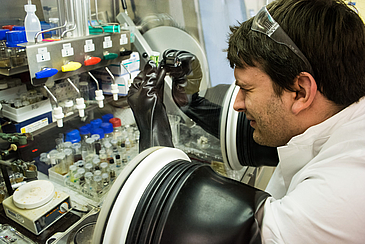The scientific connections are presented as clearly as possible in “Highlights” in order to reach a broad readership. The edition is rounded off by short news stories from teaching and research. The topics of the current magazine at a glance:
“Brezhnev Didn’t Actually Want to Be a Politician”
Professor Susanne Schattenberg, director of the Research Centre for East European Studies at the University of Bremen, has written the first academic biography about Leonid Brezhnev. Her research surprised even her. This is because it turned the image of Brezhnev being a hard-liner on its head. Instead, her extensive source material shows a highly emotional man with a talent for acting, who wanted world peace, but could no longer face political pressure in the 1970s and became addicted to taking pills. In an interview, the researcher reports on her findings and “aha” experiences during years of dealing with the topic. The biography by the expert on Eastern Europe caused a sensation and was recently awarded the translation prize of the Börsenverein des deutschen Buchhandels, which will now fund the book’s translation into English.
On the Way to the “Light of the Future”
Walls made entirely of light, also usable as screens, affordable and flexible – this is still a dream for the future, but perhaps not for long. Chemists from the Institute of Inorganic Chemistry and Crystallography (IACK) at the University of Bremen are conducting research in a field that is currently the focus of attention worldwide as one of the more promising future technologies: organic LEDs, OLEDs for short – the “light of the future.” With the development of a completely new class of copper-based substances, the scientists have now taken an important step towards the mass application of OLEDs.
The Heat Champions from Namibia
It was a visit with consequences: when microbiologist Barbara Reinhold from the University of Bremen searched for wild rice varieties in northern Namibia, she pulled cowpeas cultivated on the Okavango River from the nutrient-poor soil. What began with a look at the root system as a “professional reflex” led to the TOPSOIL project (“Towards Improving Food Security For Smallholders in Dry Southern African Climates”). As part of this project, scientists from Bremen, Hamburg, and Namibia conduct research to enable small-scale farmers in the southern part of the African continent to obtain better yields from their fields. The project – financed by the Federal Ministry of Education and Research (BMBF) and the German Academic Exchange Service (DAAD) – is headed by Barbara Reinhold.
What’s That Knocking? Geologists from Bremen Dig for Fossils in the Nevada Desert
What does it mean when geoscientists take a closer look at Triassic rock strata bit by bit, layer by layer? Well, they climb, kneel, and squat on the scree. They break open intractable ground with chisels and carefully hammer out fossils. In this case, ammonite shells in the northwestern mountain desert of the US state of Nevada.
The Professorship as a “Christmas Present” – a Portrait of Fabio La Mantia
If you want to make a career as a scientist, you make the rounds. Like the Italian Fabio La Mantia, who has persistently pursued his path and, after working in Switzerland, the United States, and Germany, finally became a professor at the University of Bremen. Since July 2015, he has been teaching in Faculty of Production Engineering. However, as a “bridge professor,” he deliberately conducts his research at the Fraunhofer Institute for Manufacturing Technology and Advanced Materials (IFAM).
The Advanced Energy Systems Institute: Research for the “Eldorado of the Energy Transition”
Professor Stefan G. Reisemann is committed to a sustainable and livable future. His unexpected passing in July 2018 shocked the university, his team, and his like-minded colleagues at the artec Sustainability Research Center. A month earlier, “Highlights” editor Karla Götz had had a conversation with the Professor of Resilient Energy Systems. Among other things, he stated: “I believe that, by 2030, a large part of our energy will come from renewable resources. The potential for geothermal energy, for example, has not yet been exhausted.” As a tribute to the scientist who was able to encourage us, the interview has been printed in the current issue of “Highlights.”
If you are curious about the topics or just want to have a look at “Highlights,” we will be happy to send you the latest issue. You can also find it on the Internet for viewing and download as a PDF.
Additional Information:
https://www.uni-bremen.de/universität/presse/publikationen/highlights/
Contact:
Kai Uwe Bohn
University Press Office
E-mail: kai.uwe.bohn@vw.uni-bremen.de
Tel.: +49 421 218-60160

